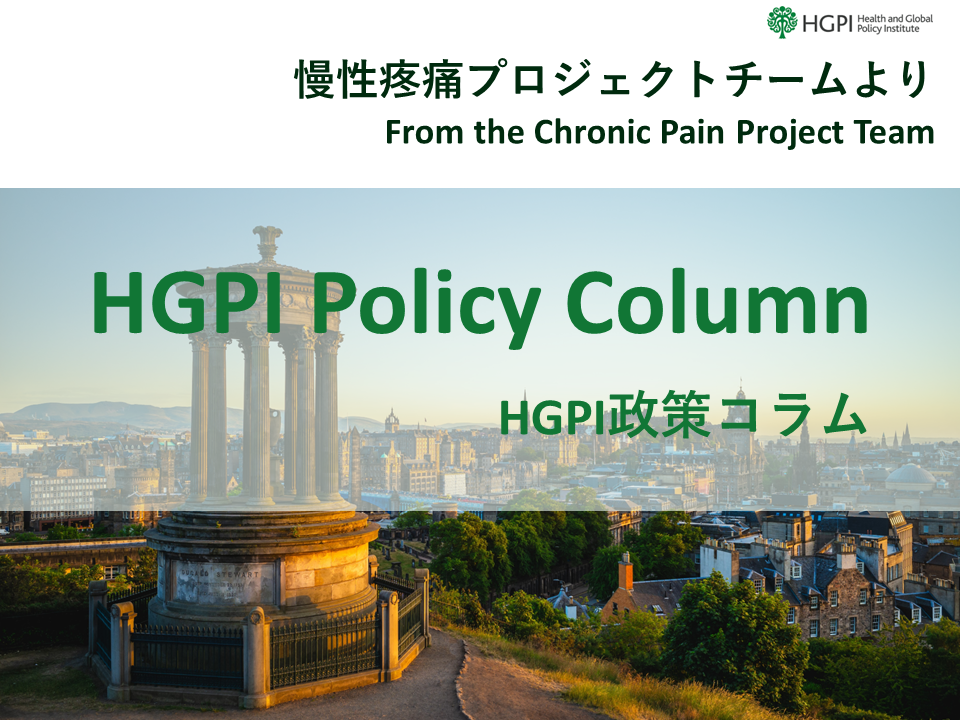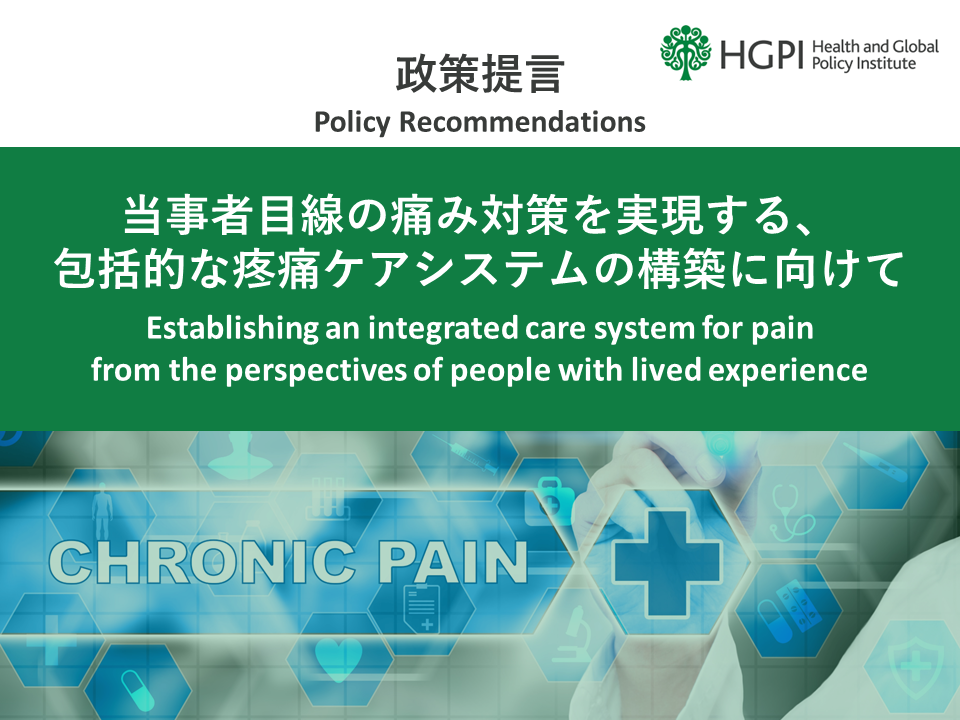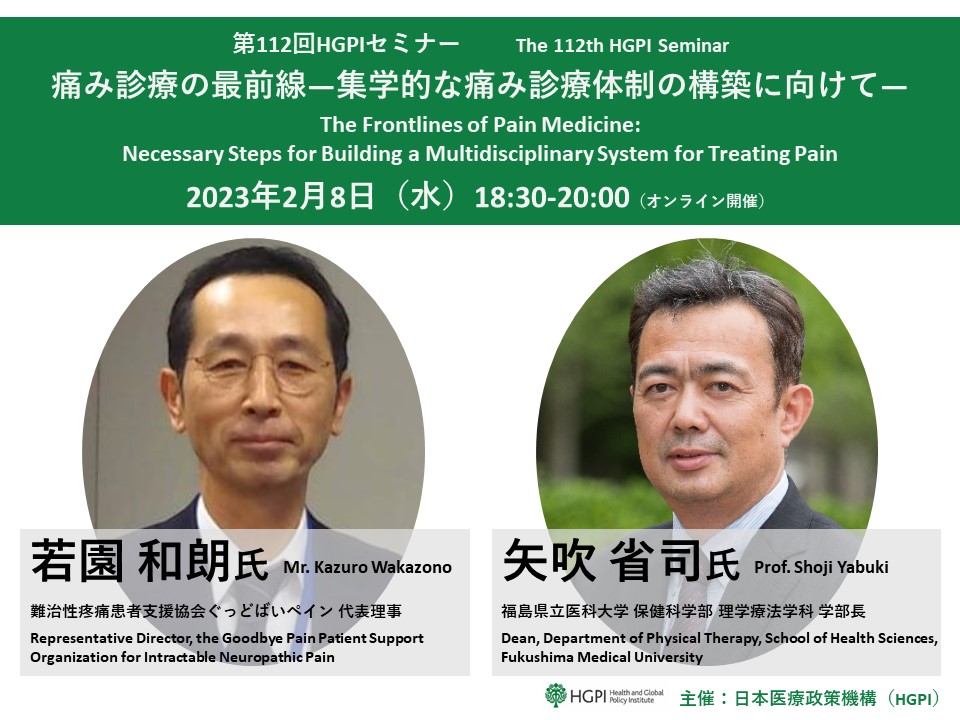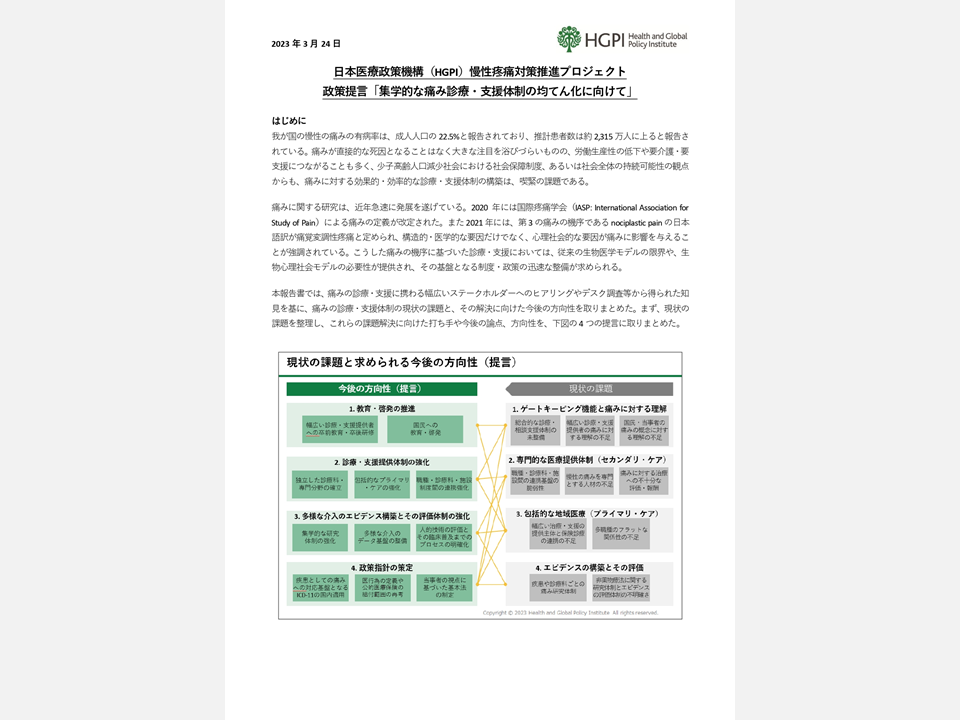[Policy Recommendations] Establishing a System That Makes Full Use of Primary Care Physicians and Can Respond to Complex Chronic Pain (July 31, 2024)
date : 7/31/2024
Tags: Chronic Pain, NCDs
![[Policy Recommendations] Establishing a System That Makes Full Use of Primary Care Physicians and Can Respond to Complex Chronic Pain (July 31, 2024)](https://hgpi.org/en/wp-content/uploads/sites/2/ncd-cp-20240731-top.png)
Health and Global Policy Institute (HGPI) Chronic Pain Project views chronic pain as a key social issue, which brings notable economic losses and often leads elderly people to long-term care and support. Since FY2021, we have been taking action to encourage measures for better and equitable pain management services.
For timely and appropriate interventions to pain, which is multi-factorial and unique to individuals, primary care has a key role to play. In Japan, the role of primary care physicians is now at a historical turning point. The system surrounding primary care physicians has been the subject of debate for many years, but after the 2023 enactment of the “Act Partially Amending the Health Insurance Act and Other Acts for in Order to Establish a Sustainable Social Security System That Covers All Generations,” comprehensive discussions on the April 2025 introduction of a system related to primary care physicians are accelerating. Given this context, we offer the following recommendations in hopes that the system for making more effective use of primary care physician services that is currently being discussed will make it possible to provide appropriate and timely services for chronic pain of all mechanisms and complexities.
For more information, please find the PDF document at the bottom.
Policy Recommendations on Establishing a System That Makes Full Use of Primary Care Physicians and Can Respond to Complex Chronic Pain
Recommendation 1: Primary care physician services should be strengthened so primary care physicians can stay close to patients’ pain regardless of its mechanism or complexity and serve as the gateway to healthcare while providing appropriate treatment and referrals to specialists.Recommendation 2: While taking into account the latest findings in pain science and how chronic pain is classified in the International Classification of Diseases, steps should be taken to develop reporting items related to primary care physician services as well as programs that provide primary care physicians with training and recurrent education.
Recommendation 3: A collaborative system that links primary care physicians and a wide range of community resources including pain centers should be established so people can receive a wide range of evidence-based interventions in their communities and, when necessary, have rapid access to multidisciplinary pain care.
Recommendation 4: Ample consideration should be given to the perspectives of pain science experts and healthcare beneficiaries during discussions on the functions of primary care physicians held at Regional Consultation Forums on Ambulatory Care.
Top Research & Recommendations Posts
- [Policy Recommendations] Achieving a Sustainable Society of Health and Longevity Through the Integration of Environment and Healthcare-Incorporating a Planetary Health Perspective into the 3rd Phase of The Healthcare Policy-(December 20, 2024)
- [Research Report] Building a Mental Health Program for Children and Measuring its Effectiveness (June 16, 2022)
- [Policy Recommendations] Integrating Climate and Health for a Sustainable Society: Incorporating a Planetary Health Perspective into Nationally Determined Contributions (NDCs)(December 9, 2024)
- [Policy Recommendations] Policy Recommendations on Strengthening CKD Strategies for Workers: The Importance of Providing Early Detection, Intervention, and Support Through Screenings and Medical Visits (October 28, 2024)
- [Policy Recommendations] Developing a National Health and Climate Strategy for Japan (June 26, 2024)
- [Research Report] The 2023 Public Opinion Survey on Satisfaction in Healthcare in Japan and Healthcare Applications of Generative AI (January 11, 2024)
- [Event Report] Planetary Health Expert Meeting Aiming for Sustainable Healthcare: Learning from the Impact of Environmental Pollution and Medical Waste During the Pandemic (February 16, 2024)
- [Policy Recommendations] Obesity Control Promotion Project 2023 “The Next Steps for Engaging and Cooperating with Patients, Citizens, and Communities for Implements of Obesity Control Measurements” (April 8, 2024)
- [Research Report] Survey of Japanese Physicians Regarding Climate Change and Health (December 3, 2023)
- [Announcement] A Turning Point Towards Building Green Healthcare Systems (June 5, 2024)
Featured Posts
-
2024-11-25
[Registration Open] (Webinar) The 130th HGPI Seminar “Marking a Decade of the Act on Medical Care for Patients With Intractable Diseases: Connecting Intractable Diseases and Society From the Perspective of a Media Professional and Family Member” (January 28, 2025)
![[Registration Open] (Webinar) The 130th HGPI Seminar “Marking a Decade of the Act on Medical Care for Patients With Intractable Diseases: Connecting Intractable Diseases and Society From the Perspective of a Media Professional and Family Member” (January 28, 2025)](https://hgpi.org/en/wp-content/uploads/sites/2/hs130-top_JPNENG-1.png)
-
2024-12-18
[Policy Recommendations] Policy Recommendations on Strengthening CKD Strategies for Workers: The Importance of Providing Early Detection, Intervention, and Support Through Screenings and Medical Visits (October 28, 2024)
![[Policy Recommendations] Policy Recommendations on Strengthening CKD Strategies for Workers: The Importance of Providing Early Detection, Intervention, and Support Through Screenings and Medical Visits (October 28, 2024)](https://hgpi.org/en/wp-content/uploads/sites/2/HGPI_20241023_FY2024CKD_eyecatch.jpg)
-
2024-12-20
[Policy Recommendations] Achieving a Sustainable Society of Health and Longevity Through the Integration of Environment and Healthcare-Incorporating a Planetary Health Perspective into the 3rd Phase of The Healthcare Policy-(December 20, 2024)
![[Policy Recommendations] Achieving a Sustainable Society of Health and Longevity Through the Integration of Environment and Healthcare-Incorporating a Planetary Health Perspective into the 3rd Phase of The Healthcare Policy-(December 20, 2024)](https://hgpi.org/en/wp-content/uploads/sites/2/e8a714648913193b03d5b6ede38c161e.png)
-
2024-12-25
[Registration Open] (Hybrid Format) Expert Meeting “Innovations Required to Achieve Precision Psychiatry” (January 22, 2025)
![[Registration Open] (Hybrid Format) Expert Meeting “Innovations Required to Achieve Precision Psychiatry” (January 22, 2025)](https://hgpi.org/en/wp-content/uploads/sites/2/mh-20250122-topr-1.png)
-
2024-12-27
[Activity Report] Second UN General Assembly High-Level Meeting on AMR (September 26, 2024)
![[Activity Report] Second UN General Assembly High-Level Meeting on AMR (September 26, 2024)](https://hgpi.org/en/wp-content/uploads/sites/2/4ED86AF7-49DE-465D-B59D-843B4F3C6102_1_201_a-scaled-1.jpeg)










